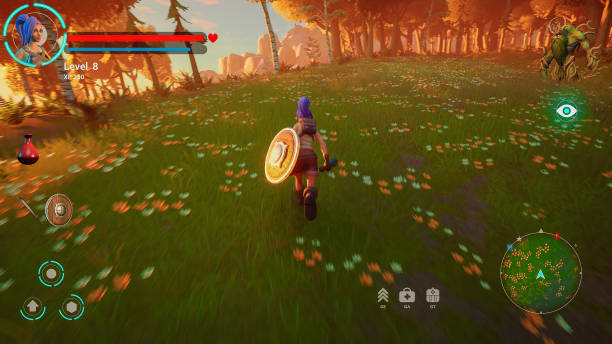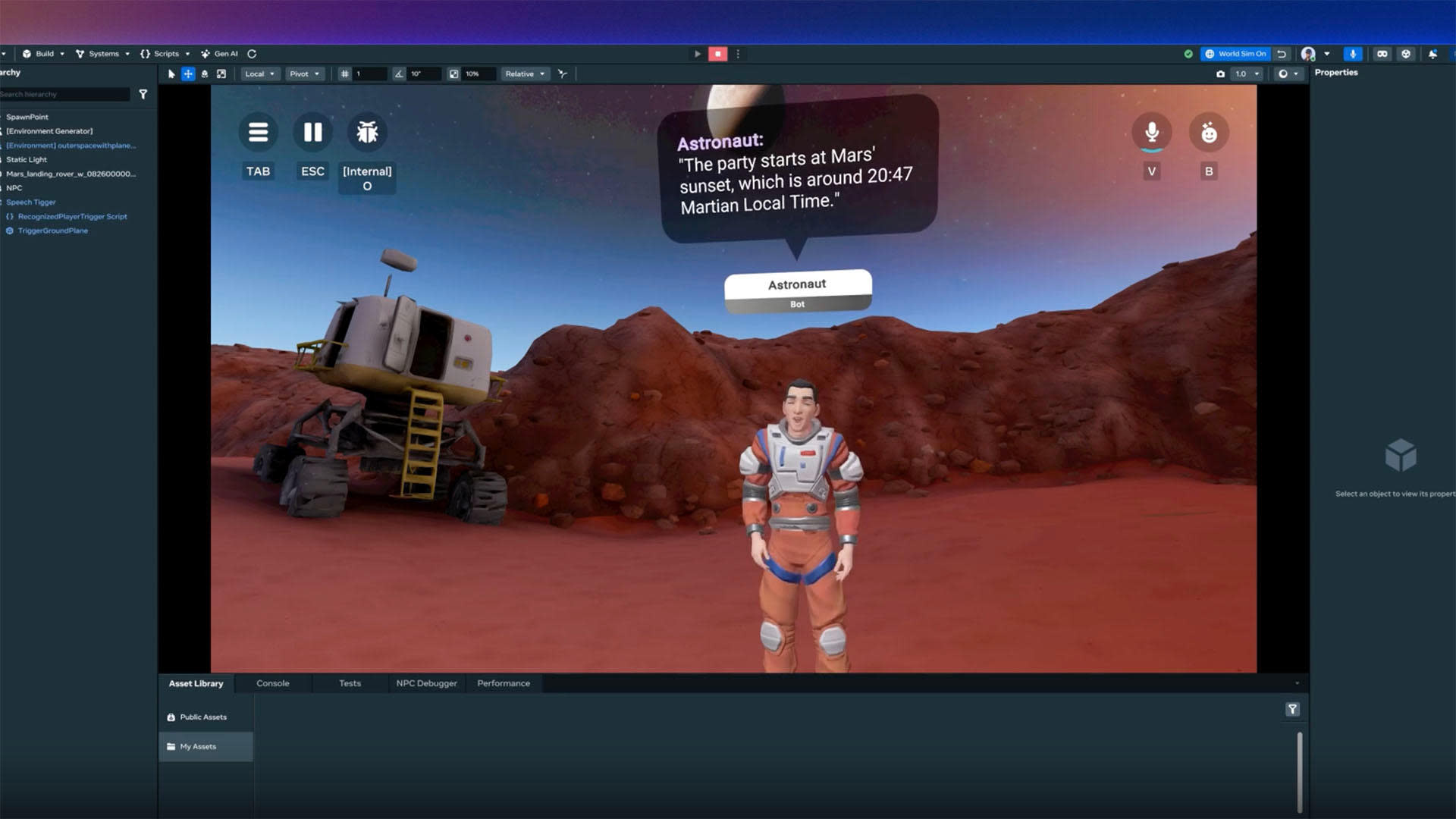
You step into a bustling metaverse city square. The air hums with a low, digital energy. Around you, avatars of all shapes and sizes—some human, some robotic, some utterly fantastical—mill about. Then, a character with an intricate, elven design catches your eye. They approach, their expression warm and welcoming.
“Greetings, traveler,” they say, their voice clear and nuanced. “The archives have reported a strange energy fluctuation in the Crystal District. An old scholar there could use a hand. Are you the one to help?”
You glance at their nameplate. It reads, “Lyra, Keeper of Lore.” You interact, and a detailed quest pops up. For a moment, it feels like any other multiplayer game. But then you realize something crucial: Lyra isn’t being controlled by a person in another country. She’s not following a simple, repeating script.
She is a Metaverse NPC. And she represents the most significant, under-the-radar revolution happening in our digital futures.
These AI-driven Non-Player Characters are poised to evolve from simple background props into the essential guides, companions, and storytellers that will make the metaverse feel less like an empty digital gallery and more like a living, breathing universe. Let’s pull back the curtain on these unsung heroes.
What Are Metaverse NPCs? They’re Not Just Shopkeepers Anymore

If you’ve ever played a video game, you’re familiar with the classic NPC. They’re the town guard who endlessly repeats, “I used to be an adventurer like you, then I took an arrow in the knee.” They’re the shopkeeper with a fixed inventory and three lines of dialogue. They are, in essence, pre-programmed automatons, adding a little flavor but no real substance.
Metaverse NPCs are a different beast entirely.
Think of them as the digital population that keeps the world running when human players log off. They are persistent, AI-powered entities designed to interact with users in dynamic, unscripted ways. While a video game NPC is a static painting on a wall, a Metaverse NPC is a living, evolving piece of the digital ecosystem.
Their core function is to create persistence and immersion. In a world built for millions, there will never be enough humans online at once to fill every role, to run every shop, or to guide every new user. NPCs are the solution. They are the invisible workforce, the ambient citizens, and the patient teachers that ensure the metaverse isn’t a ghost town.
The Evolution: From Wooden Dialogue to Dynamic Personalities
To appreciate where we’re going, it’s helpful to see how far we’ve come.
The Past: The Age of Scripts
In the early days of gaming, NPCs were glorified signposts. Their behavior was a simple “if-then” loop. If the player approaches, then say line 1. If the player says “yes,” then give the quest. They had no memory, no adaptability, and no life beyond their few kilobytes of code. They were set dressing, and we loved them for their charming limitations.
The Present: Smarter, But Still on Rails
Today, games feature NPCs with more complex behaviors. They can patrol routes, react to the player’s combat style, and even have branching dialogue trees. However, they are still ultimately “on rails.” Once you exhaust their pre-written dialogue, the illusion shatters. You hit the wall of their programming.
The Future: The AI-Powered Metaverse Citizen
This is the paradigm shift. The vision for the metaverse involves NPCs fueled by a cocktail of advanced technologies:
- Generative AI: This allows an NPC to create unique, unscripted conversations on the fly. Instead of choosing from three dialogue options, you could literally ask Lyra about the history of the Crystal District, the best place to eat, or her thoughts on the current political climate of the virtual world—and she would answer coherently, every time.
- Large Language Models (LLMs): Tools like GPT-4 act as the NPC’s brain, giving them a vast knowledge base and the ability to understand context, nuance, and even humor in your questions.
- Machine Learning: This is the real game-changer. An ML-powered NPC can learn from its interactions. If players consistently ask Lyra about a hidden cave outside the city, she can start incorporating that into her guidance for new players. She evolves, creating a truly living history of the world.
The Five Indispensable Roles of Metaverse NPCs

So, what will these advanced NPCs actually do? Their jobs will be as varied as in the real world.
1. The Guides & Information Hubs
Imagine logging into a vast metaverse for the first time. It’s overwhelming. A friendly AI NPC, let’s call him “Orion,” instantly greets you. He can answer your questions in plain English: “How do I change my avatar’s appearance?” “Where can I find a community for sci-fi fans?” “What’s this ‘digital land’ everyone is talking about?” Orion is the ultimate concierge, eliminating the frustrating learning curve that plagues many complex online platforms.
2. The Quest Givers & Storytellers
This goes far beyond “kill 10 rats.” An AI NPC storyteller could craft personalized narratives based on your interests and in-game actions. Perhaps an NPC detective notices your knack for puzzle-solving and recruits you for a multi-session mystery that changes based on the clues you find. The story is no longer a fixed track but a branching, dynamic river of content that feels uniquely yours.
3. The Digital Commerce Assistants
The metaverse will have a massive economy. AI NPCs will be its shopkeepers, bankers, and salespeople. Instead of clicking through a static menu, you could haggle with a virtual merchant. You could ask a real estate NPC to show you only parcels of land with ocean views and under a certain price. They can provide 24/7 customer service, handle complex transactions via smart contracts, and offer personalized recommendations—just like a top-tier Amazon algorithm, but with a face and a personality.
4. The Companions & Social Catalysts
Let’s be honest: the metaverse can feel lonely, especially if your friends aren’t online. AI companions can fill that void. They could be a digital pet that reacts to your emotions, a workout buddy in a fitness-focused world, or a wingman that helps break the ice in social hubs by introducing you to other human players with similar interests. They combat isolation and make the world feel warmer.
5. The Ambient World-Builders
These are the NPCs you might not even directly talk to, but you’d notice their absence. The street musician who plays a different, AI-generated tune every hour. The farmers are tending to digital crops that actually grow. The couple arguing in a cafe, the guards changing shifts. They aren’t giving you quests; they are simply living. They provide the ambient noise and activity that sells the illusion of a world that exists without you, making it infinitely more immersive.
The Magic Behind the Curtain: The Tech Giving NPCs a Soul
Creating these believable beings isn’t magic—it’s a feat of engineering. Here’s a peek at the toolbox:
- Generative AI and LLMs: This is the core of the conversational engine. It’s what transforms a query into a meaningful response.
- Natural Language Processing (NLP): This allows the NPC not just to hear, but to understand the intent behind your words. It can detect if you’re being sarcastic, asking a question, or making a statement.
- Emotion AI (Affective Computing): Future NPCs might analyze your avatar’s micro-expressions (if your hardware allows) or the tone of your voice to gauge your emotional state. A companion NPC might say, “You sound stressed today. How about we go for a virtual fly instead of battling monsters?”
- Blockchain & Smart Contracts: In a decentralized metaverse, an NPC could be more than just a character; it could be a decentralized autonomous organization (DAO). It could own its own shop, use its profits to upgrade its AI, and be governed by a community of token holders. This creates a truly autonomous digital entity.
The Inevitable Challenges: Navigating the Uncanny Valley and Ethics

This brave new world isn’t without its perils. As we breathe life into these digital beings, we must confront serious questions.
The Uncanny Valley: As NPCs become more human-like, there’s a risk of them falling into the “uncanny valley”—that eerie feeling we get when something is almost, but not quite, human. Striking the right balance between realism and stylization will be key.
Data Privacy: If you’re having deep, personal conversations with an AI companion, what happens to that data? Is it being stored, analyzed, or sold? Transparent data policies will be non-negotiable for companies employing these AIs.
AI Bias: An AI is only as good as the data it’s trained on. If that data contains societal biases (racism, sexism, etc.), the NPC will inevitably reflect and amplify them. Ensuring fair and unbiased AI training is one of the industry’s most significant challenges.
Job Displacement: Could an AI NPC replace a human DJ in a virtual club? Or a human tour guide? As these AIs become more competent, they could disrupt the nascent “play-to-earn” economy, leading to complex socio-economic debates within the metaverse itself.
Autonomy and Control: Who is responsible if an autonomous, learning NPC, trained on dark corners of the internet, begins spouting harmful rhetoric or orchestrating scams? Establishing legal and ethical frameworks for AI behavior is a challenge we are only just beginning to face.
Glimpses of Tomorrow: Real-World Examples Taking Shape
This isn’t just science fiction. The foundations are being laid right now:
- Meta’s Horizon Worlds is actively experimenting with AI-driven assistants to help users build and navigate their worlds.
- NVIDIA’s ACE (Avatar Cloud Engine) is a groundbreaking platform designed specifically for creating this new class of NPCs. It animates the whole package—speech, animation, and intelligence—in real-time.
- AI-NPCs in Decentraland/The Sandbox: While still early, there are numerous projects and proposals for blockchain-based NPCs that could own assets and operate autonomously on behalf of a decentralized community.
Imagine these use cases:
- You enter a virtual Gucci store and are greeted by a stylist NPC. You say, “I need an outfit for a cyberpunk-themed gala,” and it instantly curates a selection and lets you try it on your avatar.
- In an educational metaverse, you can have a conversation with a hyper-realistic AI simulation of Albert Einstein, asking him to explain relativity in his own words.
The Future: Digital Beings and Cross-World Identities
Looking ahead, the line between NPC and “digital being” will blur. We might see the emergence of “Soulbound” NPCs—unique, non-transferable digital entities that have a persistent identity, history, and memory. Your companion NPC in one virtual world could, with your permission, carry its memories and personality with you to another, creating a continuous digital life.
These entities could become user-owned assets. You might purchase, train, and customize an NPC to be your personal assistant, capable of managing your digital affairs across multiple metaverse platforms.
Conclusion: The Invisible Architects of Our Digital Lives
The next time you venture into a virtual world and encounter a character, take a second look. That shopkeeper, that guide, that musician in the town square—they might seem insignificant. But they are the invisible architects, the cogs in the machine that transform a collection of digital assets into a place we can call a world.
They are the key to scaling the metaverse, to making it accessible, engaging, and truly alive. They are the Metaverse NPCs: no longer just background characters, but the essential heart of the digital universe we are building together. The revolution won’t be televised; it will be simulated, one intelligent conversation at a time.


